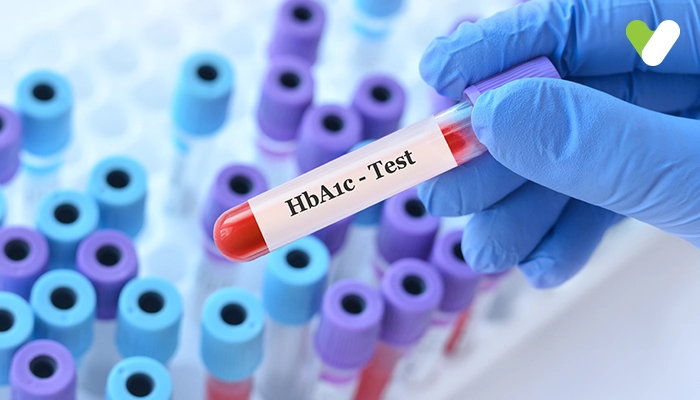HbA1c can be defined as the average blood glucose or sugar levels for the last two or three months in your body. If an individual is suffering from diabetes, then he or she should ideally have an HbA1c level of 48 mmol/mol (6.5%) or below.
If an individual is at risk of developing type 2 diabetes, then he or she should set a target of having an HbA1c level below 42 mmol/mol (6%). We understand that grasping what these numbers mean can be difficult. This is why we are going to help understand what HbA1c means, what an HbA1c test is, and why setting target levels is important.
We’ll also look at what one can do to lower his or her HbA1c levels. Beyond this, it will also be helpful to know how to use an HbA1c converter tool if an individual wants to find his or her sugar levels in % or mmol/mol.
Meaning of HbA1c Test
Let’s first start by looking at the meaning of HbA1c. HbA1c is known as glycated hemoglobin. This is a compound that is made when the glucose or sugar in the body sticks to the red blood cells.The body can’t use the sugar properly so the more it sticks to the blood cells, the more it will build up in the body. It should be noted that red blood cells are active for roughly around 2-3 months in the body. This is the reason why the reading is taken quarterly.
You must be able to tell now that a high HbA1c level means that an individual has too much sugar in the blood. Hence, that individual will be more likely to develop diabetes and complications related to it, including serious problems with the feet and the eyes.
A big part of lowering your risk of devastating complications from diabetes includes learning about HbA1c levels. Ideally, one should get HbA1c levels checked regularly. This is a vital check that should be a part of your annual body review.
Even if an individual is healthy, it is still a good idea to get this test done once a year. However, if your HbA1c level is high or needs a little more attention, then you should get the test done every three to six months.
Once you are familiar with your HbA1c levels, the next step is to know what your results mean and how you can control the levels. This is mainly due to the fact that even a slightly raised HbA1c level can put you at a higher risk for serious complications. Hence, it is important to get all your facts straight.
The HbA1c Test
If you want to check your HbA1c levels yourself, then you will be required to buy a kit. Most healthcare professionals also perform this test for free. The HbA1c test is different from a finger-prick test, which refers to a snapshot of the blood sugar levels at a particular time and on a particular day.You can find out your HbA1c level by getting a blood test done by a doctor or a nurse. The healthcare profession will arrange all this for you so you can stay healthy. It should also be noted that this test should be done every three to six months. However, if you have trouble managing your blood sugar levels or if you are planning to have a baby, then you may need to get this test more often.
Some people might also need to get this test less often, including women in the later stage of their pregnancy. Some people might also require a different test altogether like some type of anemia test. In some rare cases, a fructosamine test can be used instead.
You might also find it interesting to note that an HbA1c test is used to diagnose diabetes. If you are falling in the category of prediabetes, then this test can help keep an eye on your blood sugar levels. This test is also known as hemoglobin A1c or A1c.
Result of HbA1c Test
The results for the HbA1c test are provided rather quickly. These results can help your healthcare professional know if they need to make any changes to your treatment or medication for managing your blood sugar levels.This test also tells a number regarding your blood sugar level and it is important to understand the significance of that number. Over time, you can note down this number and keep track of it to better manage your health.
Beyond this, you should know that your HbA1c test level can change due to several reasons. Some of these reasons are:
- An individual is unwell
- One is taking medications like steroids
- There is a change in lifestyle
- One is feeling stressed or depressed
Effects of Lower HbA1c Levels
It is understandable that you might be worried if your blood sugar levels have gone up since the last time you got the HbA1c test done. However, instead of worrying about the number, you should know how to change your HbA1c levels.Some tips that you can follow to bring your HbA1c level to your target range are mentioned below.
- Getting more active and moving more can help bring down your HbA1c levels
- Consume a healthy and balanced diet
- Smoking makes it harder for your blood to flow around your body. So, stop smoking
Hence, you should consult the best healthcare professional in understanding what is the ideal blood sugar level for you. Once you understand the numbers, then you should do everything that you can to manage your blood sugar level.


